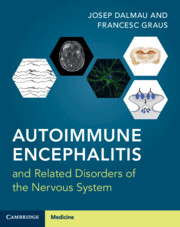Book contents
- Autoimmune Encephalitis and Related Disorders of the Nervous System
- Autoimmune Encephalitis and Related Disorders of the Nervous System
- Copyright page
- Dedication
- Contents
- Clinical Vignettes
- Videos
- Preface
- Abbreviations
- Section 1 Overview
- Section 2 Antibodies and Antigens
- Section 3 Specific Syndromes and Diseases
- Chapter 6 Limbic Encephalitis
- Chapter 7 Autoimmunity Against Proteins Associated with Voltage-Gated Potassium Channels
- Chapter 8 Anti-NMDAR Encephalitis
- Chapter 9 Seizures and Antibodies Against Surface Antigens
- Chapter 10 Acute Disseminated Encephalomyelitis and Myelin Oligodendrocyte Glycoprotein Antibody-Associated Disease
- Chapter 11 Neuromyelitis Optica Spectrum Disorders and Glial Fibrillary Acidic Protein Autoimmunity
- Chapter 12 Autoimmune Cerebellar Ataxias
- Chapter 13 Autoimmune Brainstem Encephalitis
- Chapter 14 Autoimmunity Against the Inhibitory Synapsis
- Chapter 15 Anti-IgLON5 Disease
- Chapter 16 Autoimmune and Inflammatory Encephalopathies as Complications of Cancer
- Chapter 17 Deconstructing Hashimoto Encephalopathy
- Chapter 18 CNS Syndromes at the Frontier of Autoimmune Encephalitis
- Section 4 Autoimmunity in Neurological and Psychiatric Diseases
- Index
- References
Chapter 10 - Acute Disseminated Encephalomyelitis and Myelin Oligodendrocyte Glycoprotein Antibody-Associated Disease
from Section 3 - Specific Syndromes and Diseases
Published online by Cambridge University Press: 27 January 2022
- Autoimmune Encephalitis and Related Disorders of the Nervous System
- Autoimmune Encephalitis and Related Disorders of the Nervous System
- Copyright page
- Dedication
- Contents
- Clinical Vignettes
- Videos
- Preface
- Abbreviations
- Section 1 Overview
- Section 2 Antibodies and Antigens
- Section 3 Specific Syndromes and Diseases
- Chapter 6 Limbic Encephalitis
- Chapter 7 Autoimmunity Against Proteins Associated with Voltage-Gated Potassium Channels
- Chapter 8 Anti-NMDAR Encephalitis
- Chapter 9 Seizures and Antibodies Against Surface Antigens
- Chapter 10 Acute Disseminated Encephalomyelitis and Myelin Oligodendrocyte Glycoprotein Antibody-Associated Disease
- Chapter 11 Neuromyelitis Optica Spectrum Disorders and Glial Fibrillary Acidic Protein Autoimmunity
- Chapter 12 Autoimmune Cerebellar Ataxias
- Chapter 13 Autoimmune Brainstem Encephalitis
- Chapter 14 Autoimmunity Against the Inhibitory Synapsis
- Chapter 15 Anti-IgLON5 Disease
- Chapter 16 Autoimmune and Inflammatory Encephalopathies as Complications of Cancer
- Chapter 17 Deconstructing Hashimoto Encephalopathy
- Chapter 18 CNS Syndromes at the Frontier of Autoimmune Encephalitis
- Section 4 Autoimmunity in Neurological and Psychiatric Diseases
- Index
- References
Summary
This chapter focuses on the MOG-antibody-associated disease as a distinct neurological disorder that includes several demyelinating syndromes, and it follows a monophasic or more frequently a relapsing–remitting course. In children, MOG antibody-associated disease usually presents as acute disseminated encephalomyelitis (ADEM), ADEM variants, or encephalitis that may present with seizures and isolated or predominant cortical hyperintense lesions in FLAIR MRI studies (FLAMES). In teenagers and adults the common clinical presentation is optic neuritis, myelitis, or brainstem syndromes. Some of the patients fulfil criteria of neuromyelitis optica spectrum disorders (NMOSD). Persistence of MOG antibodies is common in patients with relapses. The optimal treatment to prevent relapses has not been established. ADEM is the most frequent autoimmune encephalitis in children. The syndrome was characterized before the description of MOG antibodies and associates with distinct clinical and neuroimaging features. Brain MRI shows multiple hyperintense T2 lesions similar to those seen in anti-GABAaR encephalitis. As occur with NMOSD, ADEM is probably caused by different pathogenic mechanisms as MOG antibodies are only found in ~60% of patients. Besides MOG antibody-associated disease there are two other antibody-associated neurological syndromes that target oligodendrocytes as part of an immune attack: anti-NMDAR encephalitis and paraneoplastic encephalomyelitis with CRMP5 antibodies.
Keywords
- Type
- Chapter
- Information
- Publisher: Cambridge University PressPrint publication year: 2022

